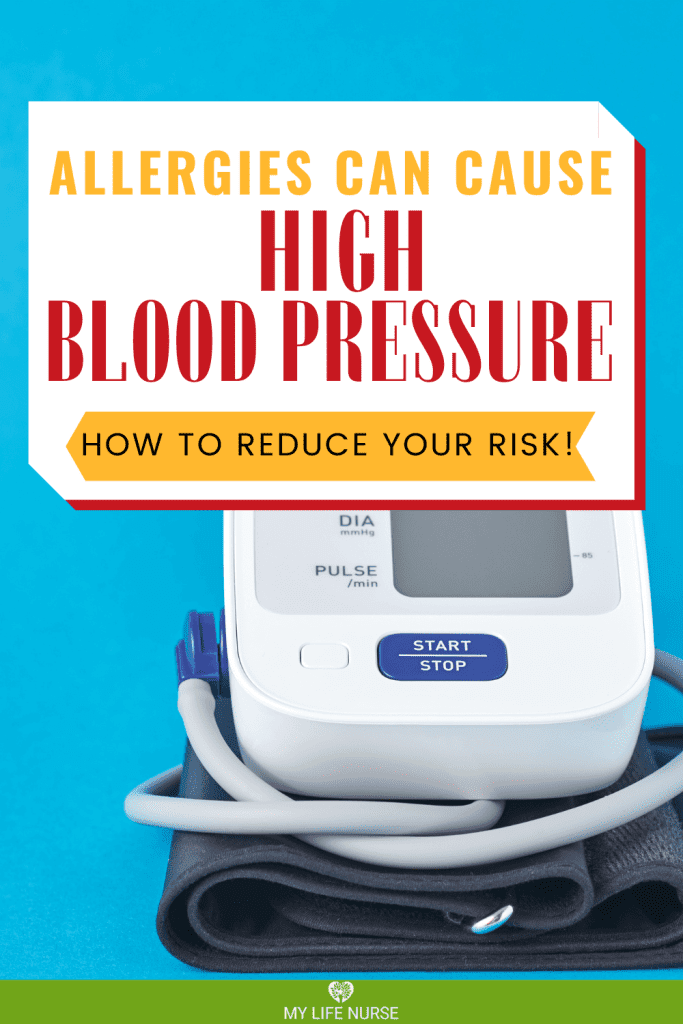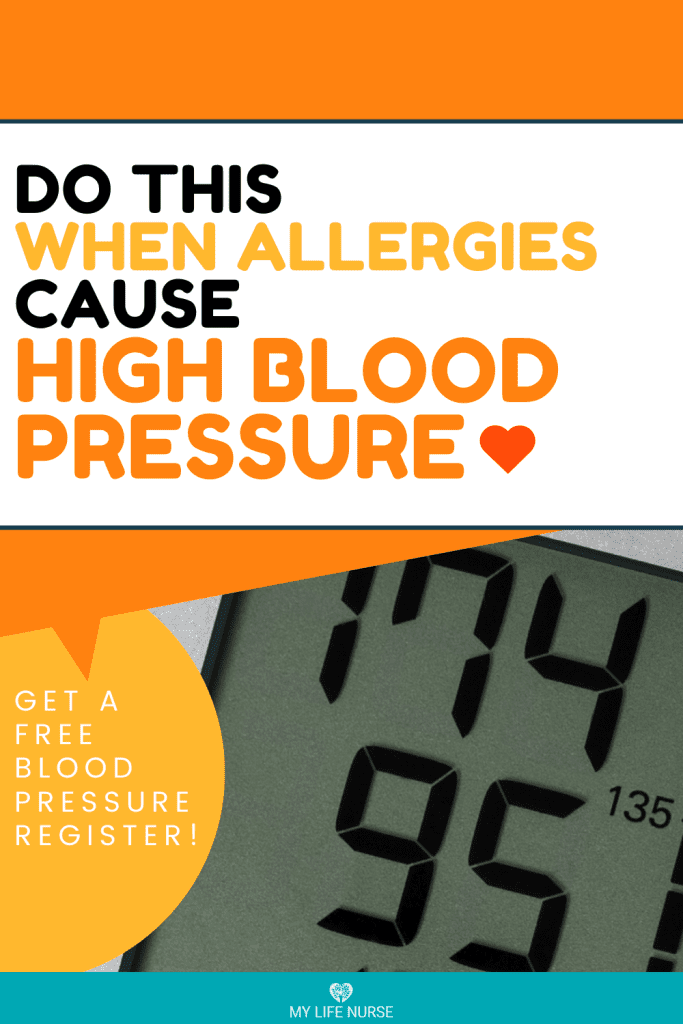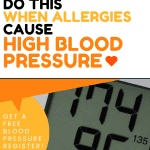Allergies don’t just cause a runny nose, watery eyes, and skin rashes; they’re also associated with an increased risk of high blood pressure. Here are 3 strategies to reduce your risk.

Allergy season is here again, with coughing, sneezing, watery eyes, and dreaded nasal congestion.
But allergies can cause more than just annoying allergy symptoms. Having allergies can also increase your blood pressure, leading to further health issues if left untreated.
In this article, we’ll explore how allergies affect your blood pressure and what you can do to keep yourself healthy. You’ll learn:
- What to do to lower your risk factors when dealing with allergy symptoms.
- The self-care strategies, natural remedies, and lifestyle changes allergy sufferers can make to reduce their risk for elevated blood pressure.
- Relevant research, based on a brief review of the 2022 scientific study, reported the association between allergies and high blood pressure.
Undeniably, it can be stressful and even overwhelming when you begin taking better care of yourself.
Many people also feel guilty when they start taking time for self-care. This Self-care Starter Guide will show you 3 simple steps to take RIGHT NOW to better care for yourself.
Be sure to grab yours! Get your FREE copy of the Self-care Starter Guide Here!

How to Lower Your Risk for High Blood Pressure 3 Different Ways When You Have Allergies
Allergies occur when your immune system reacts to foreign substances like pollen, pet hair, dust mites, or foods that don’t cause a reaction in the general population.
Antibodies are produced to tell your body that an allergen is harmful – even though it isn’t.
When you come in contact with that allergen again in the future, your immune system reacts and can cause inflammation in your skin, sinuses, airways, or digestive system.
Most people experience allergy symptoms seasonally (other names for seasonal allergies include hay fever and allergic rhinitis).
Inflammation in your sinuses and airways produces uncomfortable symptoms and can be mild to severe. Symptoms of allergies can include:
- Sneezing
- Itching of the nose or roof of the mouth
- Itchy eyes
- Watery eyes
- Runny nose
- Stuffy nose
- Allergies can even cause snoring and lead to obstructive sleep apnea, a type of gasping-for-breath breathing while asleep.
However, people with a food allergy are also associated with having elevated blood pressure.
It’s essential to focus on your blood pressure if you have allergies.
So, listed below are 3 ways to lower your hypertension risk.
My referral and affiliate links are below. If you click through & make a purchase, I may receive a commission at no additional cost to you. My full disclosure can be viewed for details.
Know Your Numbers
Thanks to the research, an association between allergies and high blood pressure has been identified.
So, don’t ignore this association!
High blood pressure occurs when the force of the blood pushing against the artery walls is consistently too high. High blood pressure causes the heart to work harder to pump blood. Blood pressure is measured in millimeters of mercury (mm Hg). Generally, a high blood pressure reading is 130/80 (or above).
Prolonged high blood pressure can lead to more severe health conditions, including heart conditions requiring heart medications or a heart attack.
Monitoring Your Blood Pressure Is Essential.
“For patients with allergic disorders, routine evaluation of blood pressure and routine examination for coronary heart disease should be given by clinicians to ensure early treatments are given to those with hypertension or coronary heart disease.”
Dr. Guo, the lead study author, stated during a press release
One of the easiest things you can do to protect your heart health is to pay attention to your numbers.
Ask your healthcare provider treating your allergy disorder how often you should see them (or your primary care provider) so they can monitor your blood pressure and heart health. Regular blood pressure monitoring is essential.
You can also use a high-quality home blood pressure monitor to take your blood pressure between visits.
If you need a product recommendation:
I like this Blood Pressure Monitor. It’s accurate, reliable, highly rated, and stores historical measurements for two people.
- ACCURATE: Our Blood Pressure Monitor includes a patented resting indicator that displays when your arm is in the correct position for a reading – the averaging function combines morning and evening results to help accurately monitor your blood pressure
- EASY-TO-READ LARGE DISPLAY: The BM55 Blood Pressure Machine has an extra large, backlit display so you can clearly see your blood pressure reading and a color-coded risk indicator helps interpret the result at home
But, if it’s out of stock, I also like this Blood Pressure Monitor for reliability and accuracy.
- 【Advanced Accuracy】 Ensuring users obtain precise health data is our top priority. Our blood pressure monitor utilizes advanced sensor technology to measure systolic accurately, diastolic blood pressure, and pulse rate. With built-in intelligent algorithms, we provide reliable blood pressure readings, allowing users to monitor their health status confidently.
- 【Comprehensive Health Monitoring】 Our blood pressure monitors not only provide blood pressure readings but also provide a comprehensive health assessment. It tracks pulse rate, allowing it to detect irregular heartbeats and provide users with complete information about their cardiovascular health.
Often, the activity required to go to the doctor’s office or just to the clinic can increase blood pressure.
Another quick note: you should not compare your blood pressure readings from one monitor to another. Each monitor will vary from another.
You need to look at the trend over time on one monitor. That’s why having your own blood pressure monitor is vital – especially if you want to reduce your blood pressure medications.
How do you treat allergies safely if you have high blood pressure?
Although a specific underlying mechanism linking high blood pressure to having allergies has not yet been identified, you can still reduce your risk by using targeted self-care to lower your blood pressure.
Practice Strategic Self-care
First, if you have high blood pressure and allergies, consider using an allergy medicine that has a low impact on your blood pressure.
Read the ingredients on any over-the-counter allergy medications you want to take. The mode of administration (nasal sprays, pills, eye drops, etc.) does not determine the drug’s safety. For example, both antihistamine and decongestant ingredients can be administered as pills, nasal sprays, and eye drops.
Be sure to carefully review the side effects of the over-the-counter allergy product. Generally, oral decongestants tend to raise blood pressure and should be taken cautiously or avoided.
- Antihistamines are generally safer than decongestants for allergy relief if you have high blood pressure. Second-generation antihistamines not combined with decongestants are the best choice for people with elevated blood pressure. (source)
- Tell your doctor about all over-the-counter medications and any supplements you are taking.
Self-care Activities for Allergies and Risk of High Blood Pressure
Second, be strategic with your self-care activities to reduce your risk of developing high blood pressure. The self-care strategies include:
- Check your blood pressure and record it regularly. Bring the blood pressure record to your doctor’s appointments.
- Take all your blood pressure medication (actually all medications) as directed by your health care provider.
- Avoid allergens when possible to prevent an allergic reaction.
- If allergen avoidance cannot happen, manage allergy symptoms with prescription and over-the-counter medications. However, only take allergy drugs that are safe options if you have high blood pressure.
- Seek medical advice if you have any changes in your blood pressure.
- Never stop taking your blood pressure medications without consulting your health care provider. Uncontrolled high blood pressure can progress to heart attack, stroke, kidney disease, and other debilitating conditions.
- Finally, if you know you have high blood pressure, follow these self-care strategies scientifically proven to reduce blood pressure.

Make Lifestyle Changes to Reduce High Blood Pressure and Coronary Artery Disease
To reduce your blood pressure, consider slowly making these lifestyle changes:
- Stop smoking.
- Lose a few pounds. As little as a 10-pound weight loss can reduce your blood pressure.
- Cut back on your salt intake.
- Move around more.
- Manage your stress.
- Get enough sleep.
- Make me-time for your health and wellness a priority – or a major focus – on your calendar.
The most important thing to remember when making lifestyle changes is to make small, attainable goals through small, easy action steps.

Do Allergies Cause High Blood Pressure? Here’s What A Research Study Concluded:
Yang Guo, Ph.D., the study’s lead author from the Department of Dermatology at the Institute of Dermatology at Peking University Shenzhen Hospital, Shenzhen Peking University-The Hong Kong University of Science and Technology Medical Center and the research team found:
A history of allergic disorders is associated with an increased risk of developing high blood pressure and coronary heart disease. Also, Asthma contributes most to high blood pressure and coronary heart disease risk.
American College of Cardiology
Data from the National Health Interview Survey (NHIS) demonstrated that adults with a history of allergic disorders have an increased risk of high blood pressure and coronary heart disease, with the highest risk seen in black male adults.
Guo shared that the study aimed [only] to determine whether adults with allergic disorders have increased cardiovascular risk.
He also stated that previous studies reported an association between allergic disorders and cardiovascular disease, which remain controversial findings. Interestingly, while not conclusive, older studies have suggested:
- Low oxygen in the blood due to obstructive sleep apnea, obesity, or inflammation. (Source)
- It is thought that asthma, hay fever, and eczema are chronic inflammatory disorders of childhood associated with chronic sleep disturbances, functional limitations of physical activity, and the use of various corticosteroids and other immunosuppressive medications. Each of these sequelae was associated with an increased risk for cardiovascular disease. (source)

What the Research Didn’t Say
In contrast, let’s look at what the research did not say about when allergies cause high blood pressure. It’s just as important to know what researchers didn’t conclude.
- While the study concluded that there was a potential association between a history of allergy symptoms and high blood pressure, it did not conclude that increased blood pressure would always occur.
- Furthermore, they did not define a specific cause.
The author, Dr. Guo, confirmed, “Further large cohort studies with long-term follow-up are needed to confirm our findings. Additionally, appreciating the underlying mechanism may help future management in such individuals.”
The Conclusion For Allergies Cause High Blood Pressure
In conclusion, taking good care of yourself is essential for lowering your risk of high blood pressure, especially if you have high blood pressure and allergy symptoms.
Don’t forget your FREE Self-care Starter Guide! Get it HERE.

Related Posts
Get Off Blood Pressure Medications: 21 Self-care Tips
4 QUICK & EASY Tips to Lower Blood Pressure
How Well Does a Dehumidifier Help with Allergies?
How to Stop Snoring When Allergies Cause Snoring
Allergies and Heart Rate: Self-care to Reduce Your Disease Risk
Can Allergies Cause Dry Eyes? Yes & Here’s Treatment!
Frequently Asked Questions When Allergies Cause High Blood Pressure
What Allergy Medicine Should You Use If You Have High Blood Pressure?
If you have high blood pressure and allergies, consider using an allergy medicine with the lowest impact on your blood pressure.
Be sure to read the ingredients on any over-the-counter allergy product you want to take.
The mode of administration (nasal sprays, pills, eye drops, etc.) does not determine the safety of the medication. For example, pills can deliver both antihistamine and decongestant ingredients.
Would you explain the NHIS study?
- As reported by the American College of Cardiology, the study used 2012 data from the National Health Interview Survey (NHIS), a cross-sectional survey of the population of the United States.
- The study included 34,417 adults overall, and over half were women. The average age was 48.5.
- The allergic group included 10,045 adults with at least one allergic disorder, including asthma, respiratory allergy, digestive allergy, skin allergy, and other allergies.
- The researchers adjusted for age, sex, race, smoking, alcohol drinking, and body mass index. they also examined subgroups stratified by demographic factors.
What did further analysis of the NHIS study show?
- Individuals with a history of allergic disorders between ages 18 and 57 had a higher risk of high blood pressure.
- A higher risk of coronary heart disease exists in study participants aged 39 and 57, who were male, and Black/African American.
Where were the SHIS study findings presented?
- The study was presented at ACC Asia 2022 Together with the Korean Society of Cardiology Spring Conference on April 15-16, 2022.
Thanks for reading! Know someone who would benefit from reading this post? Share it on social media!

Ready for more? Here are my latest posts!
- Best Printable Advent Bible Reading Plan for Rest
- 4 Quick & Easy Tips to Lower Blood Pressure
- When the Holidays Feel Heavy: 9 Simple Self-Care Tips for Missing Someone You Love
- 10 Frugal Foods to Eat for a Healthy Pregnancy and Baby
- 9 Must-Read Blog Posts to Manage High Blood Pressure Naturally
Post originally published March 6, 2023.

Be sure to grab your FREE Self-care Starter Guide! Lisa Kimrey is a 33-year veteran registered nurse (RN), speaker, and author of the Bible study, The Self-care Impact: Motivation and Inspiration for Wellness. At Mylifenurse, Lisa combines her nursing expertise with Scripture-based encouragement to show readers who serve and care for others how to begin and maintain their self-care journey – without feeling guilty or overwhelmed – to feel happy, healthy, and rejuvenated.


